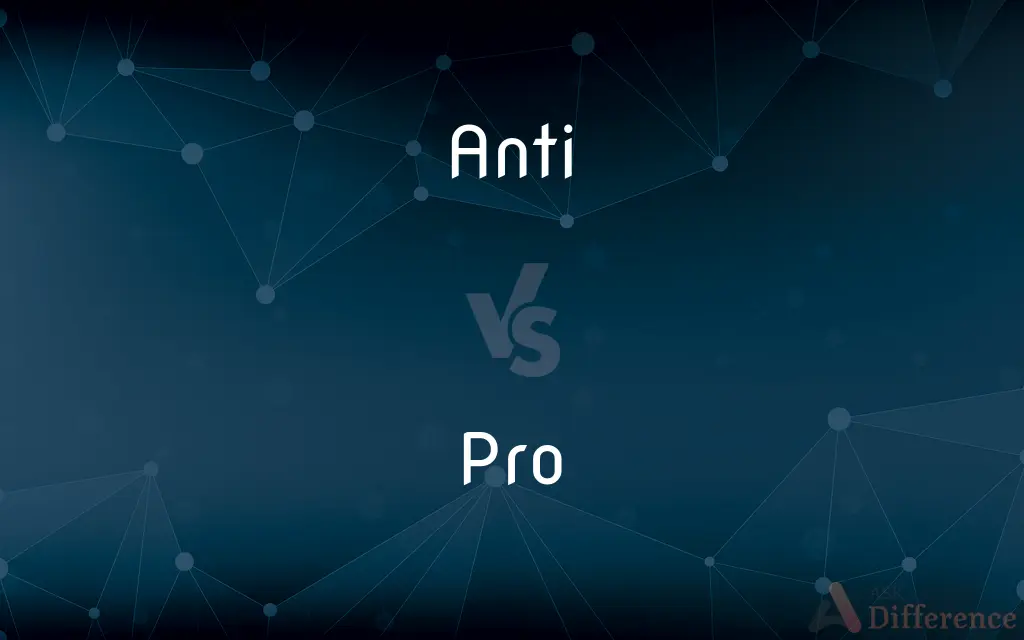Anti vs. Pro — What's the Difference?
By Tayyaba Rehman — Updated on October 26, 2023
"Anti" means opposed to or against something, while "Pro" signifies support or favor towards something.

Difference Between Anti and Pro
Table of Contents
ADVERTISEMENT
Key Differences
In the vast scope of the English language, Anti and Pro stand as prefixes that convey opposing views. Anti, derived from ancient Greek, embodies opposition, suggesting a stance against a particular concept or thing. In contrast, Pro, with Latin roots, speaks of support or endorsement, aligning with or favoring a certain idea or matter.
Frequently, Anti is utilized to highlight resistance or objection to concepts, ideologies, or practices. For instance, "anti-war" speaks of a position against conflict and battles. In the opposing corner, Pro surfaces in contexts that relay endorsement or advocacy, such as "pro-peace", which champions the cause of tranquility and harmony.
Another dimension of Anti and Pro lies in their capability to modify nouns, morphing them to express specific leanings. An "anti-hero" is not a villain but a protagonist with unconventional traits, far from the idealized hero. On the other hand, "pro-athlete" denotes an individual who excels in sports to the degree of pursuing it professionally.
In essence, Anti and Pro operate as indicators, directing the sentiment or bias of the word they prefix. Anti invariably leans towards negative or opposing connotations, while Pro brims with positivity or affirming nuances. Yet, context remains king, and these prefixes borrow depth and shade from the terms they accompany.
To encapsulate, Anti and Pro are powerful linguistic tools, shaping meanings, and imparting stances. Anti rebels, refutes, and resists, while Pro promotes, protects, and professes.
ADVERTISEMENT
Comparison Chart
Meaning
Opposed to or against.
In favor of or supportive.
Origin
Greek
Latin
Usage
Prefix denoting opposition.
Prefix indicating support or professional
Typical Contexts
Resistance, objection, refusal.
Advocacy, endorsement, expertise.
Tone
Negative or opposing.
Positive or affirming.
Compare with Definitions
Anti
Preventing, inhibiting.
The medicine has anti-inflammatory properties.
Pro
In favor of; supporting.
She is pro-choice and believes in individual rights.
Anti
A person who is against something.
He is an anti when it comes to fast food.
Pro
Advantages of; arguments for.
The team listed the pros of the new policy.
Anti
Not in favor of a particular policy or stance.
The group is anti-taxation without representation.
Pro
Professional; relating to a profession.
He is a pro golfer with several wins.
Anti
A person who is opposed to something, such as a group, policy, proposal, or practice.
Pro
A person who advocates for a cause.
She is a pro when it comes to environmental protection.
Anti
Opposed
"Douglas MacArthur had a coterie of worshipers, balanced off by an equal number ... who were vehemently anti" (Joseph C. Harsch).
Pro
A professional, especially in sport
A tennis pro
Anti
Opposed to; against.
Pro
An advantage or argument in favour of something
The pros and cons of share ownership
Anti
Opposed to something.
Pro
(of a person or an event) professional
A pro golfer
Anti
(chemistry) That has a torsion angle between 90° and 180°
Pro
In favour of
They were pro the virtues of individualism
Anti
A person opposed to a concept or principle.
Pro
In favour of
They were pro the virtues of individualism
Anti
A fan who objects to a particular creator, franchise, fandom, character, ship, etc., especially on moral or sociopolitical grounds.
Pro
An argument or consideration in favor of something
Weighing the pros and cons.
Anti
(rare) anti-
Pro
One who supports a proposal or takes the affirmative side in a debate.
Anti
A prefix meaning against, opposite or opposed to, contrary, or in place of; - used in composition in many English words. It is often shortened to ant-; as, antacid, antarctic.
Pro
A professional, especially in sports.
Anti
Not in favor of (an action or proposal etc.)
Pro
An expert in a field of endeavor.
Anti
Counteracting or neutralizing.
The solution served as an anti-venom.
Pro
In favor; affirmatively
Arguing pro and con.
Pro
Affirmative; supporting
A pro vote.
Pro
Professional
Pro football.
Pro
An advantage of something, especially when contrasted with its disadvantages (cons).
What are the pros and cons of buying a car?
Pro
A person who supports a concept or principle.
Pro
A professional sportsman.
Pro
(colloquial) Professional.
When it comes to DIY, he's a real pro.
Pro
A proproctor.
Pro
In favor of.
He is pro exercise but against physical exertion, quite a conundrum.
Pro
Professional.
He landed a pro mentorship gig.
Pro
A Latin preposition signifying for, before, forth.
Pro
For, on, or in behalf of, the affirmative side; - in contrast with con.
Pro
An athlete who plays for pay
Pro
An argument in favor of a proposal
Pro
In favor of (an action or proposal etc.);
A pro vote
Pro
On the affirmative side
Pro
Forward; projecting.
The pro-legislation movement is gaining traction.
Common Curiosities
Do "Anti" and "Pro" always serve as prefixes?
Primarily, but both can also function as nouns indicating a person's stance.
Can "Pro" be used to list advantages?
Yes, "pros" often refer to the advantages or positive aspects of something.
Does "Pro" always imply expertise?
Not always, but it can indicate professional status or strong advocacy.
How does "Anti" work in "anti-aging"?
It indicates opposition to aging, implying a reversal or halting effect.
Can "Pro" indicate professionalism?
Yes, like in "pro athlete," it denotes a professional level or status.
Are "Anti" and "Pro" derived from English?
No, "Anti" has Greek origins, while "Pro" is from Latin.
Can "Pro" denote progression or forward movement?
Yes, in contexts like "pro-growth," it suggests advancement.
Is "Anti" always the opposite of "Pro"?
In many contexts, they are opposing, but not every "anti" has a direct "pro" counterpart.
Can "Anti" and "Pro" modify any noun?
While versatile, they don't fit every noun. Context and common usage guide their application.
Does "Anti" always convey negativity?
It suggests opposition, which may be negative or simply contrary depending on context.
Is "Anti" strictly political or social in usage?
No, it has varied applications, from medicine (anti-viral) to linguistics.
Can "Pro" stand alone as a word?
Yes, it can function as a noun referring to a professional or an advantage of something.
How do "Anti-hero" and "Pro-hero" differ?
An "anti-hero" is a flawed protagonist, while "pro-hero" isn't a standard term.
Can "Anti" be about prevention?
Absolutely, like "anti-theft" suggesting preventive measures against theft.
What's an example where "Pro" signifies professional?
"Pro gamer" indicates someone who plays video games professionally.
Share Your Discovery

Previous Comparison
Nationwide vs. Worldwide
Next Comparison
Ovule vs. OvumAuthor Spotlight
Written by
Tayyaba RehmanTayyaba Rehman is a distinguished writer, currently serving as a primary contributor to askdifference.com. As a researcher in semantics and etymology, Tayyaba's passion for the complexity of languages and their distinctions has found a perfect home on the platform. Tayyaba delves into the intricacies of language, distinguishing between commonly confused words and phrases, thereby providing clarity for readers worldwide.














































